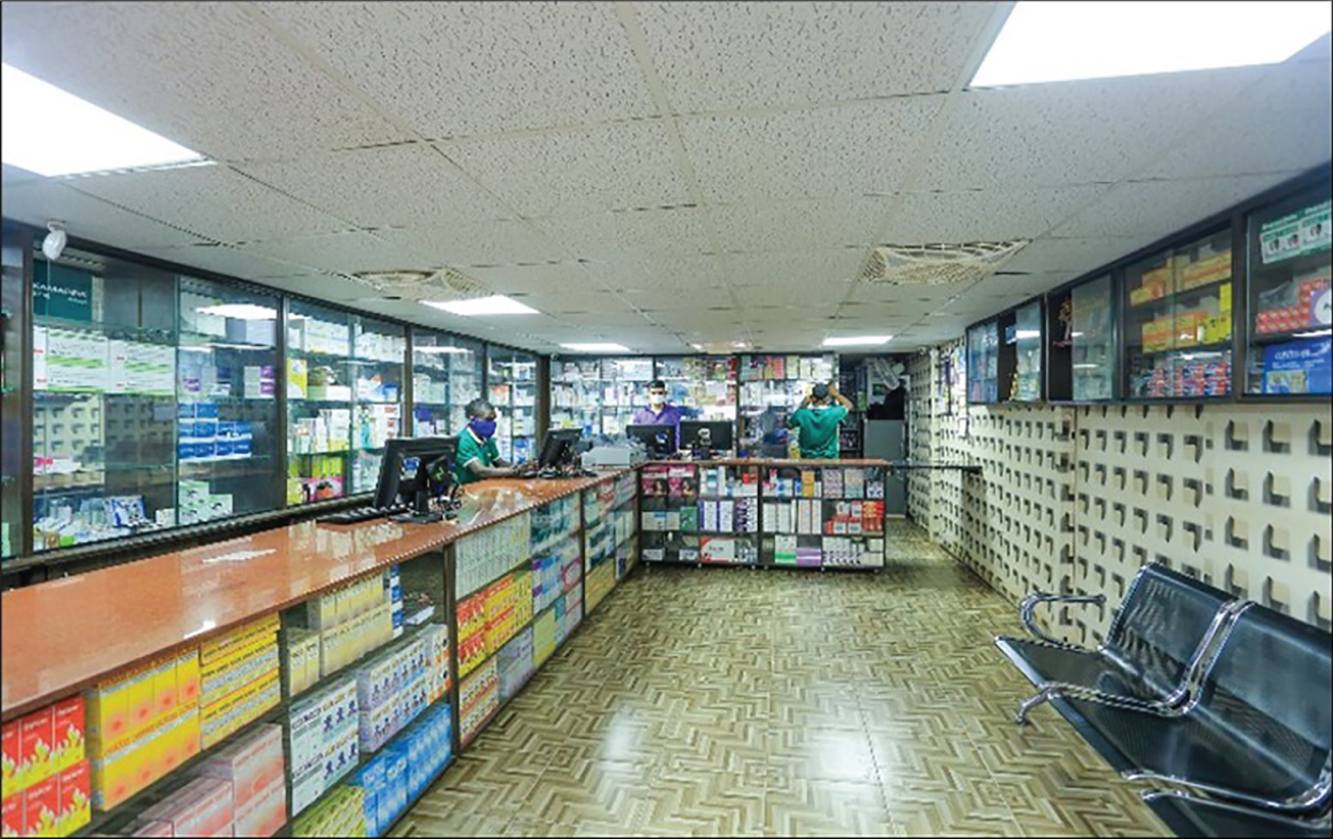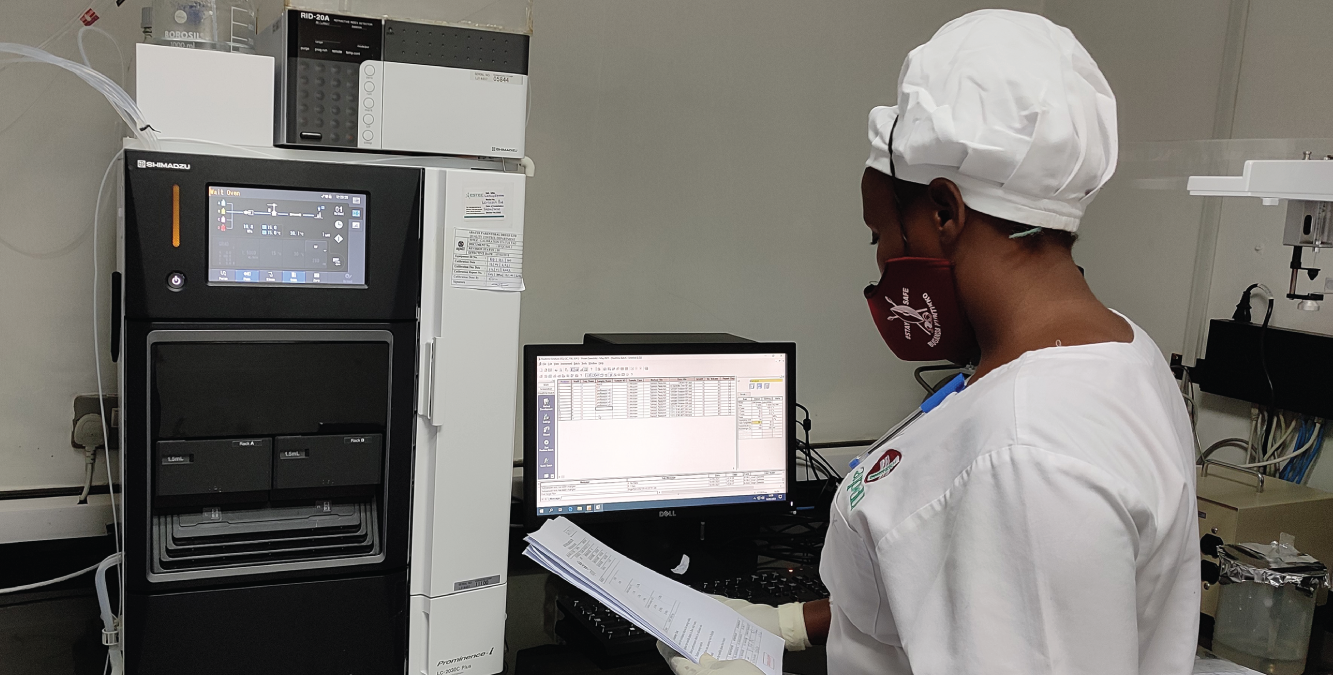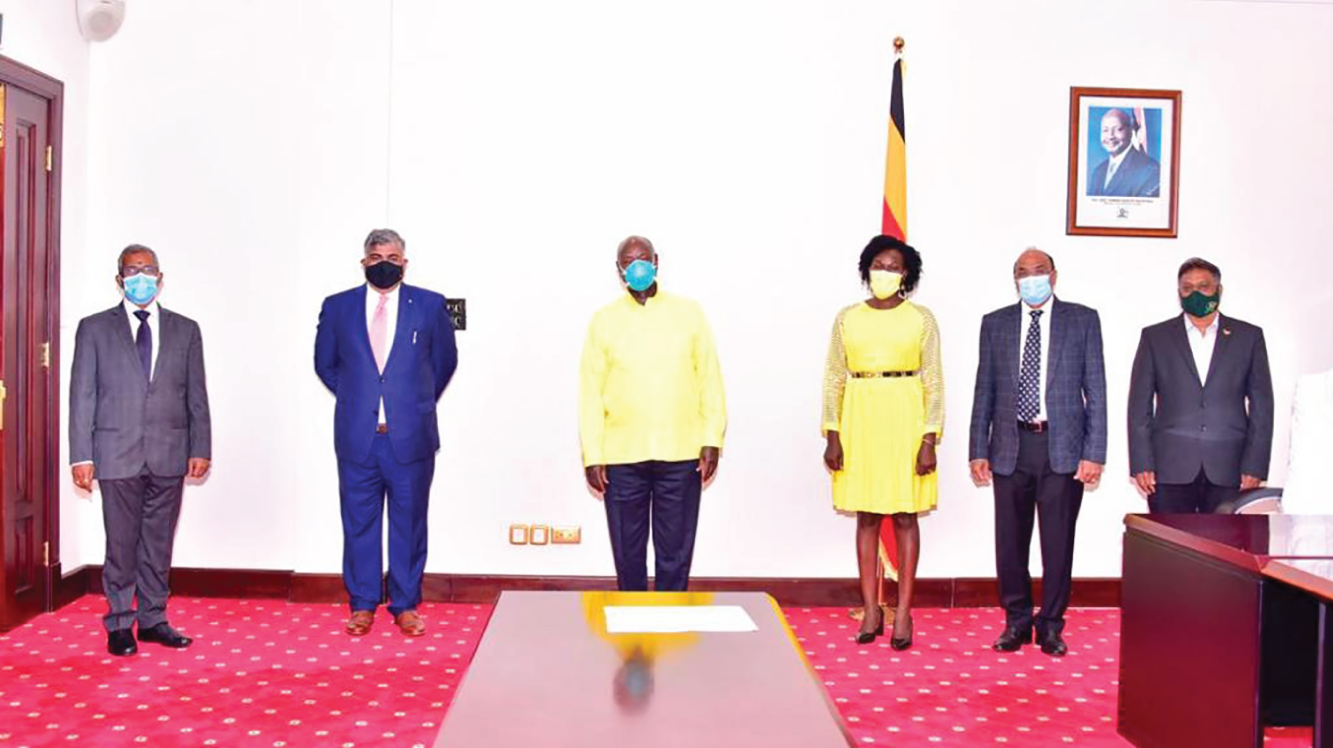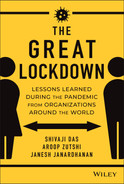CHAPTER 3
Abacus Pharma
By Rajaram Sankaran (Group CEO of Abacus Pharma)
About Abacus Pharma
Abacus Pharma, a portfolio company of the Carlyle Group, is one of the largest pharmaceutical distributors and manufacturers in East Africa. Established in 1995 in a small warehouse in Kampala, Uganda, Abacus has since grown to become a USD 100 million+ revenue company, distributing over 600 pharmaceutical products and also becoming the largest parenteral manufacturer in the region. With a wide network of 43 branches, Abacus serves a large percentage of East Africa's population and provides direct employment to over 1200 people. It aspires to be Africa's number one health and wellness company across a wide spectrum of health products and solutions in the next few years.
Backdrop
Access to quality healthcare remains a challenge in Africa, with fewer than 50% of Africans estimated to have access to modern healthcare facilities. The World Health Organization (WHO) estimates that Africa carries 25% of the world's disease burden but has less than a 1% share of global health expenditures. This problem is exacerbated by the fact that Africa still has a mere 3% share of global pharmaceutical production.
This necessitates the need for strong, homegrown pharmaceutical companies with the ability to distribute life-saving medicines to the farthest reaches of the region while also investing in local manufacturing to reduce the region's reliance on imported medicines.
The East African Community (EAC) estimates that East Africa's pharmaceutical market is worth approximately USD 2 billion, with Uganda contributing more than 20% (roughly USD 450 million) to that number. East Africa comprises six countries in the African Great Lakes region: Burundi, Kenya, Rwanda, South Sudan, Tanzania, and Uganda. Kenya is the largest pharmaceutical market in this region, with an estimated market size of over USD 750 million, followed by Uganda and then Tanzania.
With a population of roughly 177 million people and a combined GDP of USD 193 billion (2019), together with an average GDP growth of 6.5% (2018), East Africa is the fastest-growing region in Africa. This region has significant unmet medical needs, and with local manufacturers meeting only 30% of the total demand, the pharmaceutical industry in this region is one of the most attractive investment sectors in the entire continent.
Founded in 1995, Abacus Pharmaceuticals aims to provide access to life-saving pharmaceuticals across East Africa by establishing local pharmaceutical production capability and partnering with international suppliers to provide locally branded generic products or affordable medicines from abroad. We are headquartered in Uganda with direct operations across Kenya, Tanzania, Rwanda, and Burundi, and a presence across the continent.
Starting from a small warehouse 25 years ago, we have grown to become one of the East African region's largest pharmaceutical companies, with annual revenues exceeding USD 100 million in 2019, an increase of roughly 20% from 2018. We have two main lines of businesses: distribution, which contributes around 80% to our top line, and manufacturing, which contributes the remaining.
We opened our own manufacturing plant, Abacus Parenteral Drugs Limited (APDL), in 2009 with an initial investment of roughly USD 30 million and have now grown to become the largest parenteral manufacturer in East Africa, supplying over 35% of the market demand.
In 2019 Abacus reached new heights, with our core Uganda distribution business growing faster than the market, together with new frontiers coming up in the form of our local manufacturing and Kenya business, both of which grew faster than the company.
The increasing importance of local manufacturing to our business was evident in the fact that our manufacturing plant had its highest ever contribution to gross margins in 2019. We also manufactured a record of approximately 70 million units of parenteral in 2019 with capacity utilization of more than 90% in a market where average plant utilization hovers in the 60–70% range.
First Signs
With the WHO declaring COVID-19 a global pandemic on March 11, 2020, it was increasingly evident that COVID-19 would have a major effect on the global economy and completely upend the way the world conducted business. Uganda recorded its first case on March 22, 2020, 11 days after the WHO declaration.
This was also a time when the company was going through a leadership transition. Our newly appointed group CEO, Rajaram Sankaran, had just taken the reins after a successful stint at the global pharmaceutical company Abbott's India arm. The transition happened completely virtually due to the global pandemic. A number of key leadership team members had just joined the organization or were in the process of being hired. To top all of this, the leadership team and board members were in multiple time zones at that time; the countries included Kenya, South Africa, India, Canada, and the US.
The leadership team, accustomed to working in high contact, office-based settings, would now have to pivot to a completely virtual model in a matter of days. The Abacus team was more than ready to take up the challenge.
We had started preparations well before the first case in Uganda was recorded. Cases had already been confirmed in some countries where Abacus operated, such as Kenya, and a number of our suppliers in countries such as India and China had already sounded the alarm.
Abacus has always been an employee-first company, and with employee safety in mind, a newsletter called “Precautions for COVID-19 at Abacus” was circulated to all employees three days before the first case was recorded in Uganda. A slew of measures was announced, with an additional set of measures being taken at our manufacturing plant to ensure employee safety.
Hand sanitizers were installed at key locations within the Abacus premises as well as at all our branches and our manufacturing plant, with all employees requested to use them regularly. The security personnel at all entry points were equipped with no-contact infrared thermometers, and any employees showing symptoms of fever were asked to work from home. Regular fumigation and deep cleaning of the Abacus premises were also carried out. Our customer-facing team (medical representatives and branch employees) were also provided nose masks to ensure safety. (See Figure 3.1.)

FIGURE 3.1 An Abacus Pharma branch with masks and social distancing.
A few days later, the Ugandan government also announced a number of stringent measures to curb the spread of COVID-19 in the country. Four days before the first case, public gatherings were suspended for 32 days with immediate effect. A mandatory 14-day quarantine was declared in government-designated hotels for foreigners arriving in the country, together with a ban on incoming and outgoing travel from highly affected countries.
Restrictions were gradually increased, with public transport also being banned and a 14-day national lockdown declared from April 1, with a nationwide curfew in place from 7 p.m. to 6:30 a.m.
Navigating the Great Lockdown
The lockdown had an immediate impact on the way Abacus conducted business, with management taking measures to ensure smooth functioning of the company during the lockdown. With the government allowing essential businesses to operate with limited staff, all the department heads were asked to identify key staff within their departments/teams who would work during this time.
We arranged for transport for all these employees to ensure that they could commute to and from the office safely. Additionally, our hours of service were reduced by one hour in order to ensure that all employees could reach their homes before the curfew. Face masks were made mandatory at the office.
The Abacus board increased the frequency of its meetings from once every month/quarter to daily, taking into account the rapidly changing business environment. The leadership team effectively leveraged the power of remote working, with regular virtual meetings at all levels, including the group CEO, to ensure proper reporting and collaboration. All team members located in other time zones changed their working hours to ensure that they were available for most of East Africa's office hours.
Meanwhile, with the new CEO taking the reins, a number of key leadership team additions were also made, with the focus on being a diverse and high-performing team.
With one of our executive directors who handled HR transitioning to an advisory role, a new position of group chief human resource officer (CHRO) was created. A new chief financial controller was hired to augment the efforts of the chief financial officer (CFO) in managing the company's finances. A new head of business development and chiefs of staff were hired, who would help facilitate global collaborations and handle strategic projects for the organization.
Looking back, the new leadership team and other strategic hires were key in helping create our effective pandemic response strategy, bringing a fresh perspective from their experience in top companies globally.
The pandemic also had an immediate impact on the heart of our business – our supply chain. Over 80% of our revenues still came from our distribution business, and this was immediately impacted due to scaling down of production in the factories of our key suppliers, the majority of which were based in countries such as India and China.
The raw material supply of our plant was also adversely impacted because the majority of it came from foreign suppliers based in countries such as Saudi Arabia, India, and China. This disruption manifested itself in terms of shipping delays and an increase in shipping costs. Due to Uganda being a landlocked country, the majority of our goods arrive by sea at Mombasa, Kenya, after which they are transported by trucks to Uganda.
Containers that used to take roughly 45 days to arrive by sea now had a transit time of more than three months. The delay happened not only at sea but also at the Mombasa port due to limited employee strength and COVID-19 testing protocols. The increased processing time at Mombasa led to a delay of 15–30 days, contributing to the massive increase in transit time.
Considering the adverse situation, the Abacus team looked at a number of alternatives, such as procuring certain key consignments by air. This, coupled with higher shipping rates, led to an increase in our logistics costs.
New orders were also impacted, with most suppliers refusing to take new orders or taking only small orders until they were back to full capacity. By virtue of operating in a landlocked country and due to its leadership position in the market, Abacus maintains a very healthy stock level compared to its competitors to ensure there is enough supply in the market in the event of a supply chain disruption.
For most of our top products, there was both a strong pipeline of orders and a good inventory level at our warehouses. This ensured that there was a minimal shortage of essential medicines in Uganda and also served as a competitive advantage for us, with Abacus acting as the sole supplier for a number of key medicines in the first few months of the pandemic. We were also able to ensure that our branches, some of which operate in the most remote corners of East Africa and are the only reliable source of medicines to the people in those areas, were well stocked and able to service the people most impacted by the pandemic. (See Figure 3.2.)
Meanwhile, our manufacturing facility had to remain closed for 15 days, from March 30 to April 15, due to a health ministry requirement to house staff at the factory. This led to losses, and a solution had to be found that would meet regulations while also ensuring that the factory kept running. Time wasn't on our side because a plant closure for a longer period could lead to a parenteral shortage in the East African region.
Large-volume parenterals (LVPs) such as Saline and Ringer's Lactate solution were being used extensively for COVID-19 treatment, and any supply disruption could have had a major impact on the pandemic response of East African countries. We found an innovative solution that ensured the safety of workers while also ensuring that the factory kept operating.
We enlisted the help of a local school nearby, which agreed to house the workers. Schools had been closed as per government directives, and this arrangement would provide a single place for accommodating workers while also providing them a source of income during this period. We made sure that all the requirements of the workers were taken care of, including accommodation, food, and transport to and from the factory. Shift schedules were changed to ensure that curfew was followed while not affecting production.

FIGURE 3.2 Abacus Parenteral Drugs Limited provides essential supplies to the Ministry of Health, Uganda; left to right: Commissioner in-Charge of Public Emergencies Dr. Allan Muruta; Director General of Health Services Dr. Henry Mwebesa; Abacus Board Director Gertrude Wamala Karugaba; Abacus Co-Founder and Board Director Ramesh Babu.
Proper standard operating procedures (SOPs) were put in place to ensure worker safety. Personal protective equipment (PPE) was made compulsory, and social distancing measures were introduced to minimize worker interaction. Machine installations were made remote where possible, and maintenance workers were provided accommodation at nearby hotels to minimize disruption. (See Figure 3.3.)
The pandemic led to a change in the demand landscape across countries, with many once-popular therapeutic areas seeing minimal demand while a number of other therapeutic areas saw increased demand. The populations of the countries in East Africa are some of the youngest in the world. For example, approximately 47% of Uganda's population is estimated to be below the age of 15. The impact of school closures was seen immediately in decreased demand for a number of key medicines prescribed by pediatricians, especially for cough and cold, with some of these medicines seeing an almost 70% decline in sales.

FIGURE 3.3 An APDL quality control team employee at the manufacturing plant.
Our range of locally manufactured eye drops saw a major fall in demand due to ophthalmologists keeping their operations closed for an extended period of time. On the flip side, a few life-saving antibiotics such as azithromycin saw increased demand due to panic buying by pharmacies as well as stockpiling by individual customers. Products such as multivitamin tablets and oral rehydration solution (ORS) sachets also saw an increase in sales, driven by an increase in preventive medication.
A portfolio strategy was designed by the management to ensure that areas of increased demand were appropriately tracked and catered to, which would also supplement the decline in demand for other products. We also created a special Abacus COVID-19 task force, whose job was to ensure regular supply of PPE to customers across East Africa. This PPE included protective clothing designed to protect the wearer's body from various hazards, including communicable diseases. There was a major surge in PPE demand, driven by the increase in preventive measures being taken across countries.
Abacus was receiving regular queries for these products because there was a major shortage of gloves and masks in the market, with local manufacturers still working on repurposing their production lines and being unable to meet local demand. On the strength of our supplier relationships, we were able to procure these products and supply them to our customers at competitive prices.
With the pandemic taking a toll on the economy, the liquidity of many of our customers was affected. Collections were impacted, with many customers requesting an increase in their credit period. A number of our institutional partners also delayed payments due to cash flow issues and a general funds shortage in the region. A subset of these customers even had to file for bankruptcy, with Abacus recovering only a small amount from each of them during the liquidation process. However, we still had an obligation to pay our suppliers.
This is where our relationships, nurtured over 20-plus years, came into play. We were able to negotiate extended payment terms with a number of our key suppliers on the strength of our payment record. We were also offered credit lines by most major banks in the region, in case we needed them. With enough cash in the bank and a strong cash conversion cycle, we faced no major liquidity issues during the pandemic.
However, cost reduction initiatives were still put in place throughout the organization, considering the need to conserve cash in case this situation went on for a longer time. The plant team was able to decrease unit manufacturing cost by roughly 20% in just one year by driving operational efficiencies in the plant.
The Abacus team also embraced the virtual way of work, where possible, which drove additional cost efficiencies. We are proud to say that while we implemented these cost efficiencies, we were still able to ensure that there was no reduction of salaries and no permanent employee of Abacus lost his or her job in 2020. A proper communication line was established with the HR team to ensure that every employee was aware of the steps being taken by management at all times.
Future Outlook
Abacus had planned to expand its reach in its key markets even further in 2020–2021 by opening new branches in Uganda, Tanzania, Rwanda, and Burundi. This would be further supplemented with additional investment in the plant to have a wider portfolio of products. Plans were also in place to expand Abacus's reach to new markets such as French West Africa and Kenya.
A few of these plans had to be put on hold during the first few months of the pandemic. However, with our continued strong performance and the liquidity issues faced by competitors, we were able to capitalize on opportunities presented to us while also restarting most of our expansion projects.
Abacus was able to acquire seven branches in Uganda as a part of company's liquidation process, immediately growing our distribution network in Uganda from 24 to 31 branches (an increase of roughly 30%), at a fraction of the cost of building these from scratch. We were also able to secure USD 12.5 million in funding in record time from the IFC for our plant expansion project, in what was almost an entirely virtual process.
With the pandemic affecting the way we work, there was a significant slowdown in the regulatory process as well for all countries. For example, in Uganda, no registrations were approved between January and June 2020, compared to 40+ products the previous year in the same period. New products contribute 2–3% to Abacus's top-line, and this was lost due to a slowdown in the approval process.
A similar situation was seen for regulators in Tanzania, Kenya, Rwanda, and Burundi as well. However, the situation is slowly changing, with the Ugandan National Drug Authority (NDA) significantly increasing the pace of registration approvals.
The outlook for the pharma industry overall appears positive, with supply chains having now stabilized and most planned projects still proceeding according to plan, albeit with minor delays.
However, there has been a significant decrease in greenfield foreign direct investment (FDI) for both Uganda and Kenya for the period of January to September 2020 compared to the same time the previous year, and it is yet to be seen how long it would take for the rest of the industry to recover. (Uganda saw no greenfield FDI for January to September 2020 compared to USD 416.5 million in January to September 2020; Kenya saw an 85% decrease, with greenfield FDI of roughly USD 200 million in January to September 2020 compared to USD 3.5 billion in January to September 2019.)
In May 2020, the Ugandan government received USD 491.5 million from the IMF, of which 70% was used to boost foreign exchange reserves, which helped keep the currency stable. Exports have also not been impacted in both Uganda and Kenya, and the economies in the region are expected to keep growing, albeit at a slower pace. Imports dipped temporarily due to supply chain disruptions in April and May but have largely recovered.
We have a positive outlook for 2021 and plan to launch a number of initiatives to further grow our business. Abacus plans to launch its Kenya distribution business in the next few months, while APDL plans to expand to Zambia and Malawi while also looking for opportunities in other geographies. The plant expansion project is expected to get started in 2021, with completion expected by 2022.
Supply chains have largely recovered, with FDI inflows also expected to recover in the next few months. The pharmaceutical sector in East Africa has shown remarkable resilience in the face of the pandemic. On the bright side, the COVID-19 pandemic has demonstrated the issues with Africa's reliance on external suppliers for its pharmaceutical needs. Many global suppliers looked inward during the pandemic period, with even the “Pharmacy of the World,” India, restricting exports of key pharmaceutical supplies for a short period during the pandemic.
We feel that the pandemic will accelerate the move toward local manufacturing, with many countries in the region enacting more procurement incentives to encourage local manufacturing. This is already happening in Uganda, with the National Drug Authority (NDA) proposing a 25% import duty for eight molecules whose products are manufactured outside the EAC. Our conversations with regulators also indicate the same, with all of them mentioning a major impetus from local governments to support local jobs, considering the economic devastation caused by the pandemic. (See Figure 3.4.)
The EAC, in its 2nd Regional Pharmaceutical Plan of Action 2017–27, has already set a target of reducing the region's pharmaceutical imports from 70% to 50% and has set a target for governments to procure at least 50% of their requirement from local manufacturers. The African Continental Free Trade Area (AfCFTA), the largest in the world in terms of participating countries, commenced trade from February 1, 2021.

FIGURE 3.4 Uganda's pharmaceutical exports are growing much faster than its imports. Exports are expected to grow at an even faster rate after the pandemic.
Source: UN COMTRADE.
These initiatives taken by the African Union, together with many more at the East Africa level – for example, the East African Community Medicines Regulatory Harmonization (EAC MRH) initiative – will accelerate the move toward local manufacturing of pharmaceuticals in East Africa and make the region more self-sufficient in the long term. There is a huge opportunity for players who wish to serve this soon-to-be “East African single market.”
The pandemic has also made suppliers more risk-averse compared to the situation previously. Earlier, many suppliers used to be open to long-term bookings for their most popular products. Abacus had approached one such supplier with a proposal for booking a year's worth of supply, but it declined, citing that they were taking only short-term bookings to manage risk better. The working capital issues facing smaller players have worsened, impacting their expansion plans. This should hopefully change in the long term.
The pandemic has also brought to the fore new ways of healthcare delivery and has accelerated their growth in a market where most people outside of cities lack access to good healthcare facilities. In a recent consumer survey conducted by the Boston Consulting Group (BCG) in October 2020, 61% of consumers in Uganda and 69% in Kenya reported reduced frequency of health facility visits. In the face of this new reality, many healthcare providers in Africa are accelerating their adoption of tools such as telemedicine and remote patient case management. Kenya has seen a number of such telehealth platforms experience a surge in demand, with examples including companies such as 360 Health and Wellness, Access Afya, SASA Doctor, The Daktari, and Byon 8 App.
Online pharmacies have also grown, such as MyDawa in Kenya. In Uganda, the United Nations Population Fund (UNFPA) partnered with SafeBoda, a popular ride-hailing app, to launch a “personal health shop,” where users could order and receive reproductive health commodities at their doorsteps. With the substantial growth in the adoption of digital tools during the pandemic, East African governments are expected to encourage investment in digital health and similar emerging areas.
The COVID-19 pandemic has had a positive impact on the East African pharmaceutical industry, with the disruption of global supply chains further highlighting the fragility of the African health system and the need to have strong, local players. With prior experience in handling the Ebola and AIDS epidemics, Uganda's national pandemic response strategy has succeeded in controlling the number of cases. (See Figure 3.5.)
Abacus had a solid pandemic response, driven by strong and diverse leadership at all levels, deep supplier and customer relationships nurtured over many years, a best-in-class supply chain, and most importantly, its employees, all of whom were willing to embrace change and go the extra mile for their company. As articulated beautifully by Richard Branson, “A company's employees are its greatest assets, and your people are your product.” We are sure that all of these learnings from our pandemic response will ensure that we are even better prepared for similar events in the future.

FIGURE 3.5 Abacus team with the president of Uganda, discussing ways Abacus can continue to support Uganda's COVID-19 response; left to right: Abacus co-founder and board director Ramesh Babu; Abacus group CEO Rajaram Sankaran; President H.E Gen. Yoweri Kaguta Museveni; Uganda's state minister for investment and privatization Evelyn Anite; Abacus co-founder and board director Rasik Haria.
About the Contributor

Rajaram Sankaran is the Group CEO of Abacus Pharma, East Africa's leading pharmaceutical distributor and manufacturer. With over 20 years of cross-functional experience in the pharmaceutical space spanning several global markets, he is driving the next phase of growth for Abacus in Africa. He has worked at multiple global pharma and consulting companies in the past, including AstraZeneca, Ranbaxy, Torrent Pharma, Frost & Sullivan, and most recently, Abbott, where he served as the strategy and business development director for the India region.
References
- Abacus Pharma website. www.abacuspharma.com
- APDL (Abacus Parenteral Drugs) website. www.abacusparenteral.com
- BCG Report. “Building Resilience: COVID-19 Impact & Response in Urban Areas: The Case of Kenya & Uganda.” https://www.bcg.com/en-za/building-resilience-covid-19-impact-response-in-urban-areas
- Deloitte insights. “The Economic Impact of COVID-19 on East African economies.” https://www2.deloitte.com/content/dam/Deloitte/tz/Documents/finance/Economic_Impact_Covid-19_Pandemic_on_EastAfrican_Economies.pdf
- IFC Project Information: Abacus Pharma. https://disclosures.ifc.org/project-detail/ESRS/43844/abacus-ii
- Ministry of Health, Uganda. www.health.go.ug
- Mohamed, Nazeem. “The East African Pharmaceutical Sector: Opportunities and Challenges.” https://www.unido.org/sites/default/files/files/2018-03/Nazeem%20Mohamed_FEAPM_East%20Africa_Inside%20the%20Pharma%20Maret_01032018%20Bonn.pdf
- Mutembe, Danny. “East Africa: The next pharmaceutical manufacturing platform.” https://insights.omnia-health.com/hospital-management/east-africa-next-pharmaceutical-manufacturing-platform
- National Drug Authority (NDA), Uganda website. www.nda.or.ug
- Overview of EAC (East African Community). www.eac.int
- Sarki, Ahmed M., Alex Ezeh, and Saverio Stranges. “Uganda as a role model for Pandemic Containment in Africa.” https://www.ncbi.nlm.nih.gov/pmc/articles/PMC7661999/
- “Stronger communities: Abacus Pharmaceuticals, a case study by the Carlyle Group.” https://www.carlyle.com/impact/abacus-pharmaceuticals
- Ugandan Bureau of Statistics. www.ubos.org
- “Uganda's Emergency Response to the Pandemic, A Case Study.” https://thinkwell.global/wp-content/uploads/2020/09/Uganda-COVID-19-Case-Study-_18-Sept-20201.pdf
- WHO (World Health Organization) reports. www.who.int
- World Bank Open Data. http://data.worldbank.org
